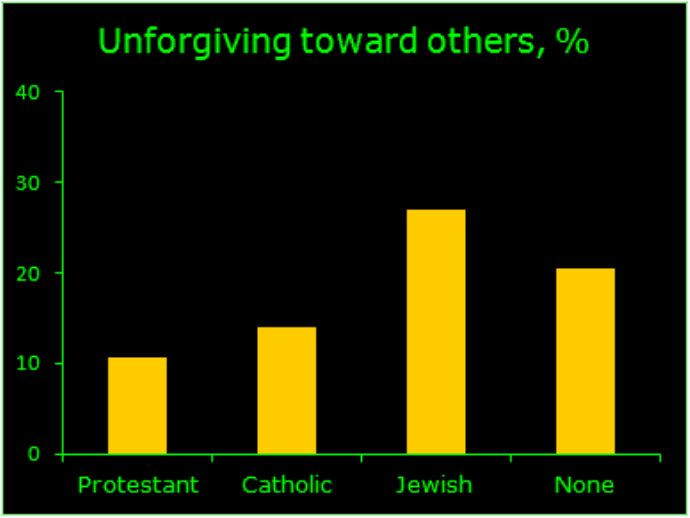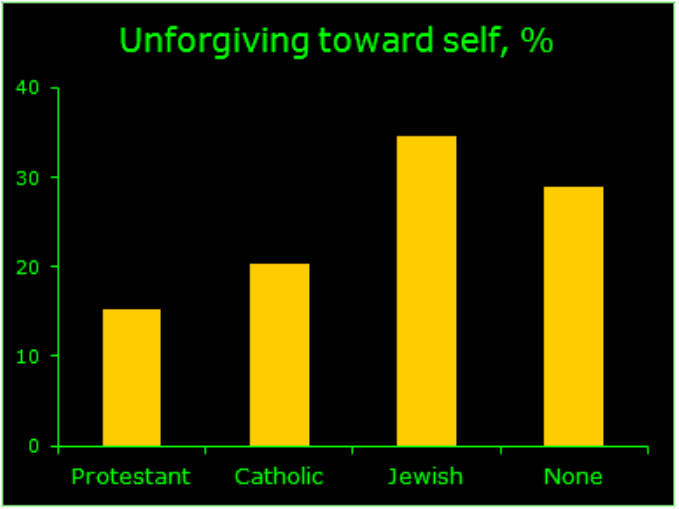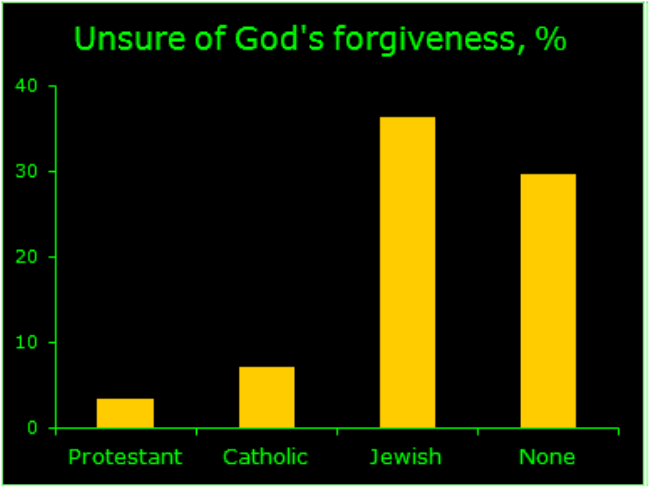Akinokure
August 24, 2014
Religion is designed to regulate social behavior according to moral norms that weaken the instinct toward selfishness and strengthen our resolve to “be a bigger person,” the better to hold together a large society. Humility is meant to curb vainglory, charity to discourage gold-hoarding, and chastity to prevent adultery.
When it comes to physical security, forgiveness is meant to break up what would be endless cycles of bloody vengeance. Later this evolved into a general attitude toward those who have wronged you, not only those who’ve caused physical harm.
And yet not all religious groups place an equal emphasis on forgiveness. This wouldn’t be the worst thing in the world if the less forgiving group were not over-represented at the highest levels of wealth, power, and influence. They would instead be more of a nuisance, like Gypsies.
The General Social Survey asked a series of three questions about how often your religious or spiritual beliefs lead you to forgive yourself, to forgive others who have hurt you, and to know that God forgives you. The responses can be lumped into a “frequent” group (“always” or “often”) and an “infrequent” group (“seldom” or “never”).
The charts below show the percent of people in each group who gave an “infrequent” response for each of the questions on forgiveness. Only the major four religious groups are included — Protestants, Catholics, Jews, and those who answered “none” for current religious affiliation.
* Respondents were restricted to whites only, to control for race. No effort was made to control for ethnic differences between Protestants and Catholics since they turned out fairly similar anyway.
Across the board Jews are more unforgiving than Christians, and surprisingly, more than non-religious folks as well.
We’ve all gotten the impression that petty behavior is more common among atheists than among those who fill the pews on Sunday, and here we see our hunch confirmed. There could be a selection effect here, where those who were raised religious but had a more unforgiving disposition drifted away from the church, leaving the more forgiving types to continue practicing as adults. But I suspect there’s also a compounding effect of no longer belonging to a higher-level group than the individual, or at most the family, and being subject to its moral norms (abstract “humanity” is a bogus claim, belied by their behavior).
How large are these differences? Let’s focus on the second question that asks about forgiving others who have hurt you. If we treat forgiveness as a normally distributed trait like height, with Protestants as the baseline height, it’s as though Catholics were less than half an inch “shorter,” the non-religious were 1.3 inches shorter, and the Jews were 1.9 inches shorter, on average.
These are not minor differences. The gap in forgiveness between Protestants and Jews is about what the height gap is between white and Asian Americans. Not only visible in everyday life, but far more pronounced at the extremes. Asian-Americans are way more likely than whites to be 5’3 or shorter, and Jews will be more likely than the goyim to never let up on holding a grudge. (Compare the academic fields of Christian Studies vs. Judaic Studies.)
You might object that this is one of those “no duh” findings, but using the GSS we’ve uncovered a pattern that casual observation would not suggest. Not only are they more unforgiving toward others, they’re more unforgiving toward themselves, and they either deny or are uncertain about whether or not God forgives them.
It would not be too much to assume that if they had asked a question about whether you believed others forgave you for your wrongs, Jews would be less likely to believe so than Christians or even non-religious folks.
There is a broad, general absence of forgiveness in the minds of Jews, which suggests a single underlying cause. Here it is probably their elevated levels of neuroticism. People who are angry, worrisome, and depressive are more likely than cool-headed people to view any remark as a slight, and any bad outcome as a conspiracy. These sting bad enough for the neurotic that they cannot be truly forgiven.
Ashkenazi Jews spent the better part of a millennium adapting genetically and culturally to a managerial niche. Have you guys interacted with managers? Who can be surprised to find that they are now more petty and vindictive than their Christian and secular goy host populations?
These are not qualities that hold together a society, high IQ or low. Indeed, the example of Israel shows how pettiness and vindictiveness must be elevated into national, or rather foreign policy, in order for such corrossiveness to be directed outward. If it were not for The Eternal Muslim — or, in a pinch, The Eternal Slav — the Jewish nation would devour itself.
Related: two earlier posts here and here on why the Parsis are a “market-dominant minority” who are loved rather than loathed by their host society.
Humility, charity, and chastity all distinguish the Parsis from the Jews, and they do not continue to harp on their persecution in previous centuries, such as the Muslim conquest of Iran that drove them into India. They seem to have forgiven the Muslims for displacing them from their homeland and having to live as a diaspora. Somehow, I don’t see the Parsis banding together to colonize Iran and forcefully reclaim their homeland a la the Zionist movement.
Jews will never collectively forgive goy Europeans, and so would never take our unsolicited advice. But they might be able to take the same advice if it came from the Parsis. Follow their example, and become viewed as a national treasure. They could not imitate them very well at the start, but in what other direction does their culture have to go?
* Jews have a small sample size of 26, but the differences between them and the others are large enough that even this small sample is good enough to give highly significant results on a chi-squared test.




